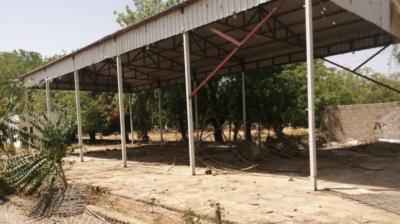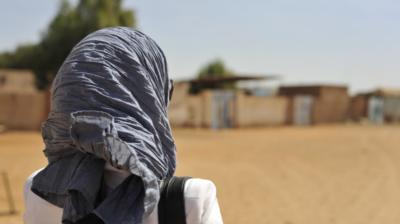Breaking the silence on domestic violence
Bound by law: Restrictions on women’s freedom
Domestic violence not on the women’s rights agenda
Abusive behaviour is widely accepted
Disciplining to protect women’s reputation
How to cite this publication:
Samia al-Nagar, Liv Tønnessen (2024). Breaking the silence on domestic violence. Bergen: Chr. Michelsen Institute (Sudan Brief 2024:2)
Despite towering evidence of domestic violence in Sudan, many are reluctant to admit that it even exists. This brief argues that this denial could be linked to a lack of understanding of domestic violence.
The brief is based on over 100 semi-structured interviews with 82 women and 12 men in Khartoum state between 2017–2022 before the outbreak of the April war. The interviewees identified by snowballing were of different ages, marital, statuses, educational levels, and professions.
In 2022, 48 000 women and girls were killed by their partner or family members across the globe. Few cases of domestic violence are reported, but it is believed to be widespread despite lack of statistical data on prevalence. So far, much of the specific knowledge about the prevalence and consequences of domestic violence in Sudan comes from the health sector. But surveys on domestic violence also point to a different challenge, the denial of its occurrence. According to the Sudan Household Health Survey from 2010, 47% of women stated that it is a husband’s right to hit or beat women for a number of reasons, like neglecting the children, burning food, arguing with the husband, leaving the house without their permission or refusing to have sex. Although the numbers dropped to 30 % in 2014, denial of domestic violence is so embedded in culture that it remains a threat to the wellbeing of many women and girls. This brief delves into this issue and asks: How do Sudanese men and women understand domestic violence?
We understand domestic violence as “a pattern of behavior in any relationship that is used to gain or maintain power and control over an intimate partner. Abuse is physical, sexual, emotional, economic or psychological actions or threats of actions that influence another person. This includes any behaviors that frighten, intimidate, terrorize, manipulate, hurt, humiliate, blame, injure, or wound someone”. Our findings suggest that domestic violence is understood narrowly as physical injury or harm whereas other types of violence are merely considered as disciplining acts to protect women’s and girls’ moral reputation and address their disobedience.
In line with our findings, data from a recent Afrobarometer survey show that 78% of Sudanese believe domestic violence is a family, and not a criminal, matter.
Bound by law: Restrictions on women’s freedom
Traditionally speaking, Sudanese family relationships are characterized by men’s domination and women’s marginalization. Men control decisions related to women’s access to resources, marriage, and movement outside the home including to social events, education, work and even health services. Family members are socialized to accept male dominance. These patriarchal gender roles were codified into law and given a religious foundation during the Islamist regime of Omar al-Bashir (1989-2019). It includes the personal status law of 1991 which is based on principles of male guardianship and a breadwinner model that stipulates that men are obliged to financially support the family (nafaqa). In exchange women are expected to be obedient. For example, the husband has the right to confine his wife (haq alhabs) to their home unless she obtains his permission to leave. This means that women need the permission of a male guardian to participate in virtually every aspect of daily life that happens outside the home: Education, work, errands, social visits, and even seeing a doctor. Male guardians are also given the authority to contract marriages on women’s behalf, including for girls as young as 10 years old.
The public order law of 1996 imposed even further restrictions on women and girls. These public morality laws, particularly restricted women’s movement in public spaces, regulating when it is appropriate to mix with men and how to dress.
Sudanese women are constantly reminded through state media and mosques not to challenge men’s guardianship. The legal framework does not protect women against domestic violence nor against gender-based violence, and the police justice sector has actively discouraged women who have tried to report or take cases to court. In fact, women and girls who report domestic violence to the police or justice sector have been rejected and sent home to resolve the problems within their family putting them at even greater risk.
“Sexual violence has continued to be used both as an oppression tactic against female protestors during the revolution leading up to the ousting of Omar al-Bashir and in the ongoing war.”
Domestic violence not on the women’s rights agenda
Historically, the Sudanese women’s rights agenda was restricted to female genital mutilation (FGM)/cutting, but the Darfur conflict and rape as a tool of war contributed to catapult sexual violence to the forefront for the women’s rights movement. This eventually forced the Bashir regime to establish the Unit of Combating Violence against Women in 2012. Despite this, sexual violence has continued to be used both as an oppression tactic against female protestors during the revolution leading up to the ousting of Omar al-Bashir and in the ongoing war.
Activists have also worked for legal reform and have focused on reform of the personal status law of 1991, including and especially focusing on child marriage, and the public order law of 1996. Despite many initiatives, reforms of the personal status law never materialized, but after the revolution, the short-lived transitional government abolished the notorious public order law.
Domestic violence has indirectly been addressed through legal reform initiatives seeking to expand women’s basic freedom and protect girls against gendered violence such as FGM/C and child marriage. However, the issue got heightened attention during the transitional period when a Sudanese girl named Samah was murdered by her father. She was run over by a car and shot three times for leaving the house without his permission over disagreements regarding where she should go to school. Despite this, the father walked free from the crime. After the incident, Sudanese women initiated a campaign on social media to unveil experiences with domestic violence. They also took to the streets to demand protection against gendered violence in both private and public spaces. During the short transitional period, which was hijacked by the military in October 2021, women activists increasingly put gender-based violence, including domestic violence, onto the agenda. Their efforts included drafting a law for combating violence against women, but the law has not been enacted.
Abusive behaviour is widely accepted
We started our interviews by asking about the power relations in the family. The responses noted that men in the family have power and they use different means to ensure that the family members respect the community’s social norms. Women must obey the men and have no right to question their orders. The majority of men and older women we interviewed denied the prevalence of domestic violence in Sudanese families. To them, domestic violence is defined as the use of force causing harm, injuries, or killing in combination with verbal aggression. Other types of domestic violence were merely framed as ‘discipline’ or ‘protection’. The types of domestic violence women face largely depend on their age and marital status, but a vast array of behaviors was mentioned, for example: Snubbing, screaming, talking in an angry voice, and verbal abuse. Also deprivation of freedom of movement and policing of dress codes, confiscation of telephones, being forbidden to visit friends without just cause, guardians deciding education and career trajectories and selection of circle of friends, or the right to simply discuss and argue a case being denied the right to family planning, surfaced as common types of domestic violence although not considered as such by the people we interviewed. Our interviews show that younger women were more inclined to have a broader understanding of domestic violence whereas older and middle-aged women support using violence to discipline their daughters.
The survey data show that such violence is widely accepted. It is seen as part of the social contract in which men are guardians of the family. They ensure compliance with traditional gender norms and culture, and they are the breadwinners – a role that gives them full decision-making power. A teacher and mother of five noted “My husband’s power at home is without boundaries. He decides everything in the family, even the midwife that comes for childbirth.”
Justifying domestic violence
Often, beating and physical violence is a response to women challenging the male guardian’s authority, for example by not asking for permission to go outside. An unmarried educated, female (31 years old) interlocutor stated: “My friend was beaten brutally by her brother until her eyes were damaged because she went out without his permission”. Putting women and girls in their place is first and foremost the responsibility of a husband and father, but as this case clearly demonstrates, in the father’s absence, brothers step in.
Young women’s experiences clearly illustrate that elderly women also play an active part in domestic violence. It is interesting to note that some female interlocutors viewed this as violence when committed against themselves as wives and mothers, but as protection when it concerned unmarried daughters. A housewife of five children (50 years old) stated that “Restriction to the movement of wives is violence as women are not prisoners of men. But restriction of young girls is protection, not violence”.
Domestic violence was framed and justified in two different ways; a) discipline to protect women’s and girls’ moral reputation, and b) discipline to women’s and daughter’s disobedience in order to maintain authority.
“It is clear from the interviews that women are not trusted to behave morally without the guardianship of men.”
Disciplining to protect women’s reputation
Discipline to protect women’s and girl’s moral reputations is connected to respect for traditional and cultural norms for women’s movements and public appearances outside the family home. This includes restrictions on dressing, socializing with friends, and mixing with men outside of the family. An unmarried female university student (20 years old) said “Restriction of women’s movement is a right of men.” Although some of the women we interviewed regarded this as domestic violence, the majority considered it to be acceptable. A divorced university graduate man (41 years old) put it like this; “restriction to women and girls is not violence but protection of reputation and from bad company. A woman or a girl who moves freely people would say, her husband or father is not able to control her.” It is clear from the interviews that women are not trusted to behave morally without the guardianship of men. In Sudanese society, transgressing gender norms can damage not only the reputation of women and girls, but also their families. As a consequence of a damaged reputation, the women and girls will not be attractive in the marriage market.
“Arguing with and provoking husbands constitute an act of disobedience that requires disciplining, according to our interviews.”
Disciplining to maintain men’s authority
Discipline as a way of punishing disobedience is considered to be a family affair. Because of the articles on obedience (91–95) in the personal status law of 1991, women can in fact be declared disobedient (nashiz) and lose her right to financial support (nafaqa). Husbands are responsible for ensuring that wives undertake their home responsibilities, including childcare, cooking and housework. Our interviews revealed that both women and men consider not doing or delaying house chores for whatever reason as disobedience for which husbands are entitled to discipline wives. An illiterate woman (45 years old), married for 30 years put it like this; “My husband beats me brutally if the food is not ready and if I argue with him although I am working and contributing to house income”. Arguing with and provoking husbands constitute an act of disobedience that requires disciplining, according to our interviews. Interestingly, the husband can also refuse sexual intercourse with wives as a way of discipline for example when they have gossiped or quarrelled with in-laws. Women on the other hand cannot refuse sexual intercourse. It is her obligation and the husband’s right. A woman (32 years old), married for 10 years said; “A wife cannot refuse sex with her husband this is not her right”. According to prevailing social norms and also Sudanese law, marital rape does not exist as sexual intercourse is considered women’s obligation. An educated unmarried man, age 29 years, said; “Refusing sex is not violence from husband as this is his right and he is the person who decides for sex relations and the wife by religion should not refuse sex even if she is tired, it makes a man feel inferior”.
Conclusion
Domestic violence is supported by the personal status law and deeply embedded patriarchal norms. Considering how deeply engrained domestic violence is in Sudanese society, long-term interventions, both in terms of legal reform and changes in social, cultural, and religious norms and practices, are necessary to protect women and girls against such violence. Currently, the April war makes it difficult to hold a state responsible for protecting women and girls against gender-based violence, especially in a situation where sexual violence is also being used as a weapon of war. It is therefore more important than ever to address the ongoing sexual and gender-based violence against Sudanese women and look at it as a continuum across private and public spheres and peace and conflict to tackle the root causes. When peace negotiations take place, then Sudanese women who are currently discussing, and advocating for their participation in peace negotiations, should be ready to put gender-based violence, including domestic violence, onto the peace agenda. To participate in the negotiations Sudanese women, need the support of the international community to ensure that they are not excluded/marginalized by the warring parties and politicians as experienced in previous peace negotiations.
Endnotes
UN Women (2022). “Gender-related killings of women and girls (femicide/feminicide): Global estimates of female intimate partner/family-related homicides in 2022” Available at: Gender-related killings of women and girls (femicide/feminicide): Global estimates of female intimate partner/family-related homicides in 2022 | Publications | UN Women – Headquarters
UNFPA (2020). Voices from Sudan 2020: A qualitative assessment of gender-based violence in Sudan. Available at unfpa_16th.pdf
Ahmed, A.M. & A.E El Mardi. (2005). “A study of domestic violence among women attending a medical centre in Sudan”. Eastern Mediterranean Health Journal 11 (1/2) 2005: 164-174; Elsharief, G.M., M. Ahmed, G. E. Aunsa, S. M. Abdalla, H.H. Abdurahman, S.F. Shabbir, W.A Asra, Nida G Zeb, E.Y. Mohamed. (2021). “Violence against Women in Khartoum, Sudan, 2018”. Journal of Research in Medical and Dental Science 9(3): 78-81
UN (n.d) “What is domestic violence” Available at: What Is Domestic Abuse? | United Nations
Afrobarometer (2024) “Sudanese oppose the use of physical force against women, but see gender-based violence as a private matter” Available at: Sudanese oppose the use of physical force against women, but see gender-based violence as a private matter – Afrobarometer
El Nagar, S. & L. Tønnessen (2017). «Family law reform in Sudan: Competing claims for gender justice between sharia and women’s human rights” CMI Report 5, Chr. Michelsen Institute Available at 6401-family-law-reform-in-sudan.pdf (cmi.no)
Nasreldin, I. (2021). “Sudanese women march for protection against gender-based violence”. Sudan blog, Chr. Michelsen Institute. Available at Sudanese Women March for Protection Against Gender Based Violence (cmi.no)
This is confirmed by four lawyers interviewed for this study.
Nihar, S. (2024). “Sexual violence in Sudan: From denial to recognition. Sudan Brief 1, Chr. Michelsen Institute Available at Sexual violence in Sudan: From denial to recognition (cmi.no)
El Nagar & Tønnessen (2017).
Salih, Z. M. (2021) “Ugliest crime: Outcry in Sudan over lack of justice for killing of teenage girl. The Guardian, 26 March. Available at ‘Ugliest crime’: Outcry in Sudan over lack of justice for killing of teenage girl | Women’s rights and gender equality | The Guardian
Salih, Z. M. (2021) ‘‘There is a war on women in Sudan’: Women demand protection against violence and harassment. The New Arab, 20 April. Available at Sudanese women demand protection against domestic violence and harassment (newarab.com)
Liv Tønnessen







